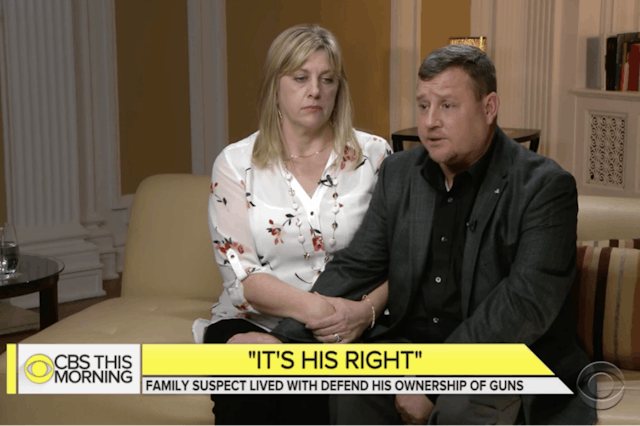Family Who Took In Parkland School Shooter: 'It's His Right' To Have A Gun

Family who took in Parkland shooter Nikolas Cruz defends decision to let him own guns
The family who took in Nikolas Cruz knew he was depressed and had a history of violent outbursts, but say it was “his right” to own five or six guns, including AR-15s.
James and Kimberly Snead opened up to CBS News about Cruz’s mental health, gun ownership and their feelings about the tragedy that took 17 lives at Stoneman Douglas High School in Parkland, Fla., last week. Cruz had been living with the Sneads for about three months before the shooting.
Cruz was diagnosed with depression, ADHD and autism, according to a Florida Department of Children and Families report released late Monday. Broward County sheriff’s deputies responded to calls from Cruz’s mothers home 39 times between 2011 and 2016, according to the report. Some of incidents were allegedly violent outbursts by Cruz.
“Did it worry you, him having access to guns?” CBS News correspondent John Blackstone asked the Sneads.
“No, he was just depressed. We thought he was just depressed over his mother’s death,” James Snead replied.
Despite their knowledge of Cruz’s mental state, the Sneads stand by their belief that Cruz had a right to own guns. Although the couple made Cruz lock his guns in a gun safe when he moved in with them, they told CBS News that they were mistaken about the number of keys to the gun safe. They believed they had the only key, but now suspect Cruz had a second key.
They also admitted that they weren’t sure how many guns Cruz owned while he lived with them.
“I knew he had five or six; I didn’t know what kind they were. It didn’t matter what kind of guns they were. I have guns. I respect guns as long as they’re handled properly, safely,” James Snead told CBS News.
“You thought it was fine for a 19-year-old to have an AR-15?” CBS News’ Blackstone asked the Sneads.
“It’s his right to have it,” James Snead told him.
“Do you feel any differently about that now?” Blackstone asked.
“No. Nope,” James Snead replied.
A study published in the journal Pediatrics in June found that nearly 1,300 children die from gun-related injuries and 5,790 are treated for gunshot wounds each year. For children age 17 and younger, between 2002 and 2014, the study found that 53 percent of the deaths were homicides, 38 percent were suicides and 6 percent were accidental.
The shooter playing with a gun was the most common cause of accidental firearm deaths of children, regardless of their age.
The American Academy of Pediatrics (AAP) affirms that the most effective way to prevent youth suicide, homicide or accidental injury or death is the “absence of guns from homes and communities.” The organization also recommends comprehensive gun safety measures, including the use of gun safes and lockboxes, waiting periods, mental health restrictions for gun purchases and a ban on assault rifles.
The Sneads disagree. When asked if they feel any responsibility for the shooting, James Snead replied, “We feel heartfelt sorrow for the families involved. As far as being responsible, feeling responsibility, you know we worked that out and there was nothing different we would have done.”